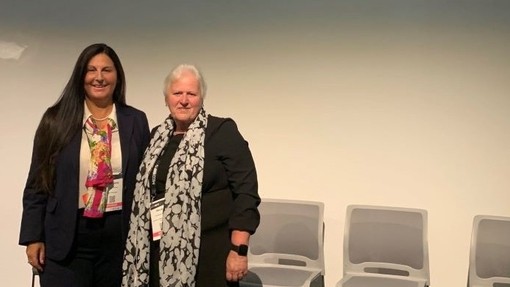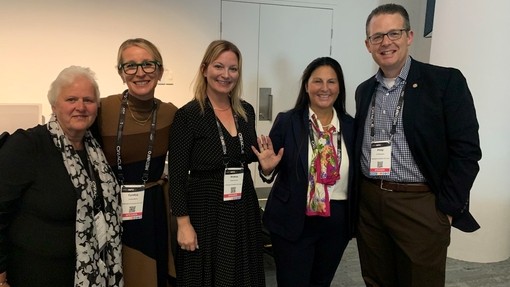Collaboration is key, says first international policy forum on digital health
International collaboration is critical if nations are to harness the power of new and disruptive technologies to collectively advance digital health for their citizens, experts say. Professor Wendy Dearing, Dean of the Institute of Management and Health is among senior healthcare, industry and research professionals who have called for a greater role for cross-border initiatives underpinned by global standards and specification pathways.

Professor Dearing attended the first International Policy Forum for digital health, held over two days as part of global digital health and informatics congress MedInfo23 in Sydney, Australia, which brought together a wide range of senior executives from governments, international VIPs, ministerial delegations, as well as senior representatives from industry and the scientific community.
Professor Dearing said: “At UWTSD we take pride in our ability to work with partners to ensure our digital health programmes are contemporary and reflect the ‘real world’ context. We have brought in industry professionals to work alongside our academic team and continue to explore and build further links to provide our students with the tools to build upon their unique expertise to grow a culture of inclusion, by using their digital and data skills to continue to deliver a first-class health and care service to our citizens.’
Earlier this year, UWTSD and Ajeenkya D Y Patil University (ADYPU) in India signed a Memorandum of Understanding (MoU) to exchange expertise in healthcare technology and systems.
The partnership between the universities will see the delivery of postgraduate health technology programmes at the ADYPU with the aim of producing health technology professionals to contribute towards the cost-effective delivery of healthcare in India.
The expertise of the Wales Institute of Digital Innovation (WIDI), developed by UWTSD and Digital Healthcare Wales, is central to the partnership. Areas currently being explored include research and innovation, student and staff exchange as well as professional development. There are also similar collaborations under way with universities in Australia and St Louis in the United States.
The forum was co-hosted by the International Medical Informatics Association (IMIA) and the Australasian Institute of Digital Health, with a large number of regional and global participants representing public and private sectors.
In its public Communique released this week, the policy forum foreshadowed an exponential increase in consumer demand for information to aid personal decision-making about health and care. It said the delivery of healthcare continued to evolve in a digital world, and governments had a responsibility to ensure its quality and efficacy.
“The disruptive transformation of healthcare provides the tipping point for governments to take a different path than in the past. A unique opportunity exists now to respond to these disruptions in a timely, collaborative, and measured manner and to effect sustainable regulatory and policy pathways for a new era of healthcare.”
The forum called for healthcare leaders to be “bold, radical, and stay the course,” saying there were common challenges across nations that needed to be addressed.
“Leaders across healthcare must make tough decisions, such as addressing workforce challenges, changing behaviours, introducing progressive enabling regulation and ensuring the healthcare system adapts to an ageing population using digital technology.”
Healthcare systems needed to achieve more complete, reliable, and accessible healthcare information via standards that enhanced interoperability. This would drive better healthcare experiences, integrate care, and support the rights of citizens to have access to their healthcare information.
“As leaders in the international digital health sector, it is imperative that we build momentum, working collectively to enact meaningful change, support safe deployment of innovative technologies and deliver improved healthcare outcomes for all.”
The wide-ranging policy discussion covered innovations such as the deployment of artificial intelligence, stating that AI required careful integration with existing healthcare systems to ensure health equity was maintained and that systems remained safe and trusted.
“This requires governance structures that have sufficient authority, while also being adaptable to rapidly changing technology capabilities.”

Further Information
Rebecca Davies
Executive Press and Media Relations Officer
Corporate Communications and PR
Email: rebecca.davies@uwtsd.ac.uk
Phone: 07384 467071
